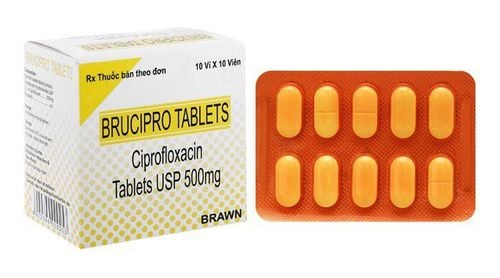This is an automatically translated article.
Posted by Dr. Do Minh Hung - Head of General Surgery Department, Vinmec Central Park International General Hospital.A diverticulum is a bulging sac that can form on an internal organ. Although a diverticulum is most commonly found in the colon, it can develop anywhere in your digestive tract.
1. What are diverticula and multiple diverticula?
Multiple colonic diverticula are bulging pouches that protrude outside the colon wall. Multiple diverticula can occur anywhere in the colon but is most common near the end of the colon on the left side (the iliac colon).2. What is diverticulitis?
Diverticulitis is a condition in which the diverticulum becomes inflamed and the tissues surrounding the diverticulum become swollen. If the inflammation is severe, the diverticulum can rupture, spreading bacteria from the colon to surrounding tissues causing an infection called peritonitis or forming a localized infection called an abscess.3. Is colonic polyposis common?
Multiple diverticulum is most common in industrialized countries where diets are low in fiber and high in processed carbohydrates. The US, UK and Australia have higher rates of multiple diverticula than other places such as Asia or Africa, where diets are high in fiber.In the US, multiple diverticula accounts for more than 50% of people over 60 years of age. About 10%-25% of people with multiple diverticula will experience diverticulitis.
4. What causes multiple diverticula?
It is believed that multiple diverticula forms when there is increased pressure in the colon, possibly due to a number of reasons such as:Low fiber diet makes stools hard and slow passage of stool through the colon, increased increased pressure in the colon. In addition, repetitive straining during bowel movements also increases pressure.
Certain medications such as antihypertensives, diuretics, and narcotic pain relievers can increase constipation and increase pressure in the colonic lumen. Any of these causes of increased pressure can lead to the formation of multiple diverticula.

Chế độ ăn uống ít chất xơ là một trong những yếu tố tăng nguy cơ gây đa túi thừa đại tràng
5. Does diet contribute to diverticula?
A low-fiber diet makes stools harder and can lead to constipation, which increases pressure in the intestines, which can lead to the formation of a diverticulum.There are two types of fiber needed to keep stools soft and to prevent constipation. Fiber dissolves in water and forms a soft gel-like substance in the digestive tract. Insoluble fiber passes through the digestive tract almost unchanged and can have a laxative effect, helping stool to pass. Good sources of fiber include fruits and vegetables, whole grains, and legumes such as lentils.
6. What are the most common symptoms of the disease?
Many patients with multiple diverticulum are asymptomatic. About 20% of patients have some symptoms related to difficulty in defecation due to narrowing of the left colon. Symptoms may include abdominal pain, gas, bloating, rectal pain, and diarrhea.In some cases, the patient may experience serious complications including:
Severe diverticulitis (infection) Pelvic abscess due to rupture of the diverticulum Generalized peritonitis Intestinal obstruction Lower gastrointestinal bleeding ( bleeding into the large intestine)
7. What causes bleeding in diverticular disease?
When diverticulitis erodes into a blood vessel at the base of the diverticulum it can lead to diverticulitis bleeding causing red, black, or dark brown blood and blood clots during bowel movements. The patient may or may not have abdominal pain. Bleeding may occur and stop or persist for several days in a row. If bleeding is active, the patient is usually hospitalized. Heavy bleeding may require surgery to remove the colon carrying the diverticulum.8. When should I see a doctor?
If you have any of the following symptoms and have been previously diagnosed with a diverticulum: Abdominal pain; Fever; Diarrhea; Vomit; Rectal bleeding, which can be a sign of multiple diverticula, diverticulitis, or other serious illness.Go to the emergency room immediately if you have known multiple diverticulitis or previous episodes of diverticulitis and you experience any of the following symptoms:
Severe abdominal pain Persistent fever with abdominal pain Severe vomiting Constipation persistent with bloating or gas Severe pain or other symptoms that you have previously experienced during an episode of diverticulitis
9. How is diverticulitis diagnosed?
Multiple diverticula are diagnosed by colonoscopy. The disease can also be diagnosed with a CT scan of the abdomen and pelvis or a contrast X-ray of the colon. During an episode of acute diverticulitis, a CT scan may be used to diagnose the extent of the infection.10. How should a patient with asymptomatic or mildly symptomatic multiple diverticula be treated?
Có một số loại thuốc có thể điều trị các triệu chứng nhẹ như đau bụng do co thắt cơ
There are several medications that can treat mild symptoms such as abdominal pain caused by muscle spasms. Antispasmodics can be used in this case.
11. Antibiotics used in the treatment of diverticulitis?
If you have diverticulitis with mild symptoms, antibiotics may be usedlow fiber.
12. When does diverticulitis require surgery?
If diverticulitis does not respond to medical treatment, surgery may be necessary. This usually includes drainage of the abscess and surgical resection of the colon with diverticula. Persistent hemorrhagic multiple diverticulum requires surgical resection. Surgery is also needed in case of multiple diverticula eroding into the bladder causing vesico-colic fistula, causing severe recurrent urinary tract infections and passing stools and gas.13. Can multiple diverticula be prevented?
Chế độ ăn giàu chất xơ có thể ngăn ngừa hình thành thêm túi thừa
At Vinmec Central Park International General Hospital (HCMC), a new technique is being applied in the treatment of multiple colonic diverticula: Robotic surgery with a hand-held robot. This method has many advantages compared to both classical laparoscopic surgery and robotic surgery with:
Instruments with surgical heads act as flexibly as wrist joints to help access narrow angles, increasing the possibility of dissection and less damage to the surrounding area compared with classical laparoscopic surgery; Automated endoscopes through voice, laser, eye tracking, ... help doctors actively control and have better vision and control, increase accuracy and safety in performing surgery ; With the advantage of compactness, robotic arm surgery is less invasive and has many advantages such as small incision, less pain, low risk of infection, thereby helping customers less blood loss during surgery, quick recovery; The cost is much lower than robotic surgery. >>>> Customers can refer to information: Day surgery, outpatient surgery
Patients will be consulted and treated with experienced endoscopic doctors and directly operated by Dr. Do Minh Hung - Head of General Surgery - Vinmec Central Park General Hospital. Dr. Hung has more than 25 years of experience in the field of General Surgery and has carried out dozens of valuable scientific research works, published many unique surgical techniques, bringing positive treatment effects.
To register for examination and treatment at Vinmec Central Park International General Hospital, please contact Hotline: 0283 6221 166 or register online HERE.
Phẫu thuật ít xâm lấn bằng robot (robotic surgery) với robot cầm tay




